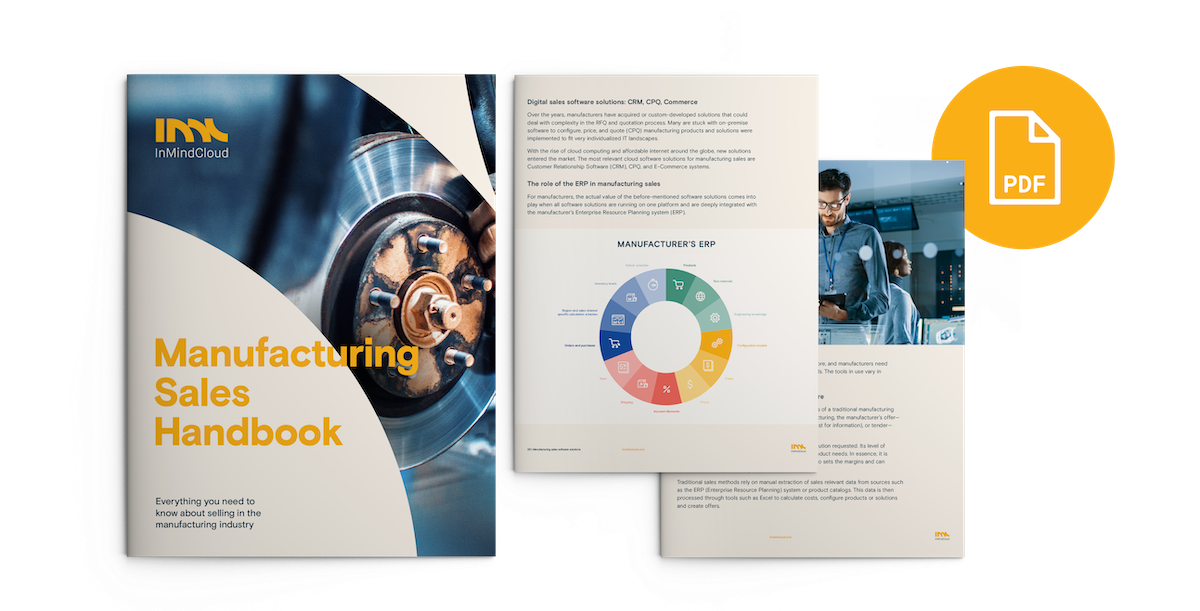Account-Based Marketing for the industry - Is it worth it?
There are two key challenges that define sales in the manufacturing sector.
-
A limited number of customers
-
Long sales cycles and a generally complex sales process
Customers are difficult to find, and each lead triggers a long string of resource-intensive sales activities. Manufacturers are increasingly turning to digital sales to streamline their complex sales cycles. Intelligent sales automation ensures that any customers you find can seamlessly buy the products and solutions they need.
However, that only solves half the problem. How can manufacturers find a go-to-market strategy that gets leads into their digitally streamlined sales cycle? According to research, B2B organizations—which includes B2B manufacturers—are turning to account-based marketing (ABM) to score leads.
A successful ABM strategy requires a deep understanding of how your manufacturing business sells. Download our Manufacturing Sales Handbook to refresh your sales knowledge and get ready to seize the opportunities coming your way!
So what is ABM?
ABM is a fairly simple concept. The idea behind ABM is to identify the best-fit customers and sell directly to the decision-makers within their organization. Marketing efforts are targeted at each stakeholder. Marketing materials comprise only elements that are of interest to the specific stakeholder.
For example, the COO gets only information on how your business can help him with operations. The CEO gets information on how your products and services can help him grow their business. The head of engineering gets product specifications and information on how your products outperform the competition.
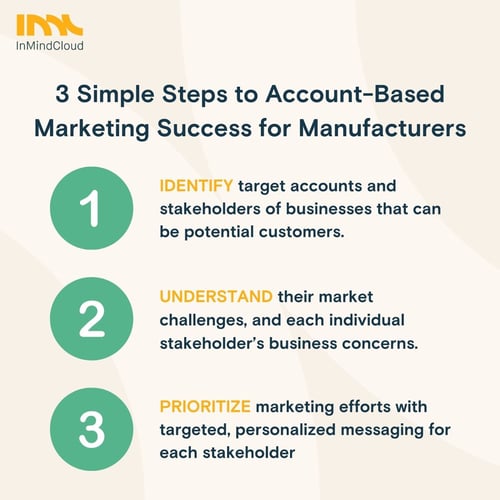 ABM is a simple concept but a powerful strategy that can help manufacturers increase sales
ABM is a simple concept but a powerful strategy that can help manufacturers increase sales
3 simple steps to ABM success for manufacturers:
- Identify target accounts and stakeholders of businesses that can be potential customers.
- Understand their market challenges, and each stakeholder’s business goals and concerns.
- Prioritize marketing efforts with targeted, personalized messaging for each stakeholder within the target organization
ABM is all about sales and marketing alignment
The first thing that manufacturers need to know about ABM is this: It requires a complete alignment between sales and marketing. If your business has already figured this out, then it has a solid foundation for building your ABM strategy.
Manufacturers can use ABM to:
- Gain higher-quality opportunities with larger deal sizes
- Build stronger engagement and better relationships
- Create more opportunities to cross-sell and upsell
Why manufacturing SALES should care about ABM
We’ve established earlier that ABM is an ideal tactic for B2B manufacturing businesses. But why should sales teams care? It requires extra effort that could eat into time that sales might want to spend on customers. The answer? Despite its name, ABM is a strategy used to INCREASE sales. That means sales teams need to spend less effort to gain more sales.
ABM is not a just a marketing strategy. It’s a sales strategy supported by marketing.
Instead of waiting for your marketing team to deliver leads—that may or may not pan out—you work with them to target and convert opportunities that you define. This helps you focus on targeting and building relationships with the potential customers that bring in the most value—bigger customers that help you hit (or even exceed) your targets.
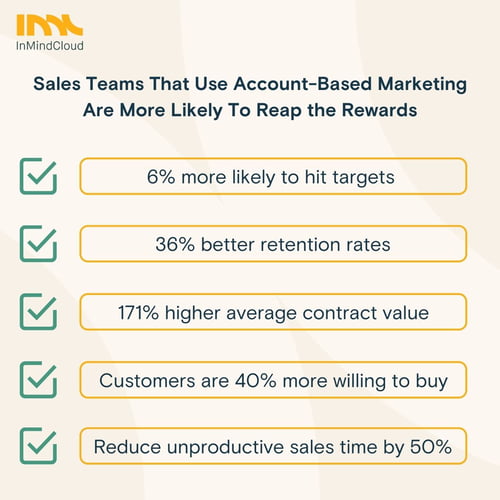
ABM done right can have a significant impact on manufacturing sales
According to research, sales teams that deploy ABM:
- Are up to 6% more likely to hit targets
- Have up to 36% better retention rates
- See up to 171% higher average contract value
- Have customers 40% more willing to buy
- Reduce unproductive sales time by 50%
Easier ABM with manufacturing sales digitalization
Traditionally, ABM can be heavily dependant on the sales team. The sales team needs to identify the ideal customer profile (ICP), discover their challenges, and propose solutions to solve them. They would then identify key stakeholders, and craft (with help from marketing) specific messages for each of them. Using analog methods, this approach could take days or even weeks to complete.
However, modern digital sales solutions can now streamline this process to hours. Digital sales solutions are now powerful enough to store the customers’ information and make them easily accessible to the entire sales team and the marketing team. With information readily available, every salesperson is the one who knows the customer best, and marketing can prepare matching collaterals that address the customers’ specific challenges.
With a fully digital commerce portal, you can even display this targeted information for pre-defined customer segments. For example, you can upload a video demonstrating the efficiency of your machine together with your product offer. Or you can also include ROI data and machine run-rates to only appear for specific target personas.
Industry-leading digital sales solutions come with powerful configuration capabilities that can help sales configure custom-fit solutions or products in minutes. A manufacturing-focused Digital Sales Platform has commerce capabilities that eliminate the burden of managing information requests and smaller after-sales requests.
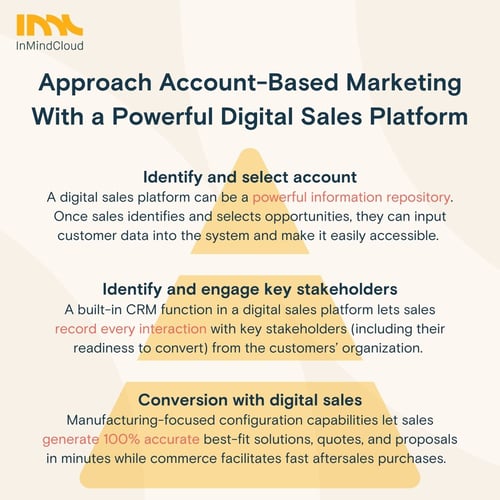
Approach ABM with a Digital Sales Solution
- A Digital Sales Platform can be a powerful information repository. Once the sales team identifies and selects opportunities, they can input customer data into the system and make it easily accessible.
- A built-in CRM function in a digital sales platform lets sales record every interaction with key stakeholders (including their readiness to convert) from the customers’ organization.
- Manufacturing-focused configuration capabilities let sales generate 100% accurate best-fit solutions, quotes, and proposals in minutes while commerce facilitates fast aftersales purchases.
Get ABM right with digital sales built for manufacturing
Once you have built your ABM strategy, you will need to look for ways to execute it efficiently. Here’s an example of how a machine manufacturer can get ABM right with help from their Digital Sales Platform.
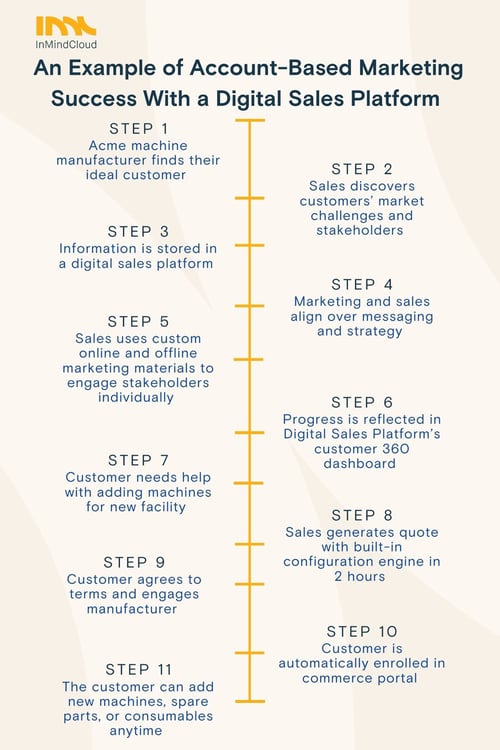 A Digital Sales Platform can automate manual, time-consuming tasks in your ABM strategy
A Digital Sales Platform can automate manual, time-consuming tasks in your ABM strategy
An Example of ABM Success With a Digital Sales Platform
- Acme machine manufacturer finds their ideal customer
- Sales discovers customers’ market challenges and stakeholders
- Information is stored in a Digital Sales Platform
- Marketing and sales align over messaging and strategy
- Sales uses custom online and offline marketing materials to engage stakeholders individually
- Progress is reflected in Digital Sales Platform’s customer 360 dashboard
- Customer needs help with adding machines for a new facility
- Sales generate a quote with a built-in configuration engine in 2 hours
- Customer is happy with the quote and decides to buy
- The customer is automatically enrolled in the commerce portal
- The customer can buy new machines, spare parts, or consumables anytime
In our example, we can see that an intelligent Digital Sales Platform can take the complexity of your manufacturing business and turn it into a strength. Some of the most time-consuming tasks such as configuration, approval workflows, or even aftersales inquiries or transactions can be reduced to a single, painless step in the entire sales process.
An ABM strategy is a sound investment for manufacturers. But its full potential can only be realized with a Digital Sales Platform built for manufacturers. Book a no-obligation demo with our manufacturing sales experts, and we will walk you through our software, and the features that support your pursuit of growth. You can also download a copy of our Manufacturing Sales Handbook to find out how else to optimize your manufacturing sales.

 Deutsch
Deutsch


